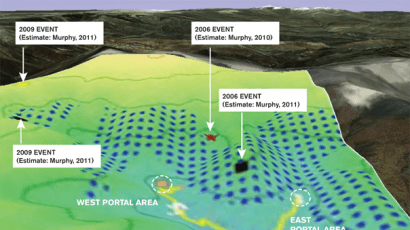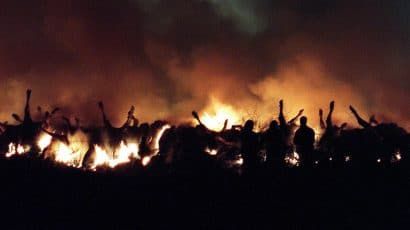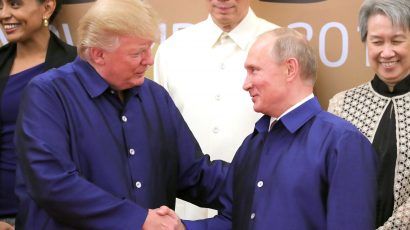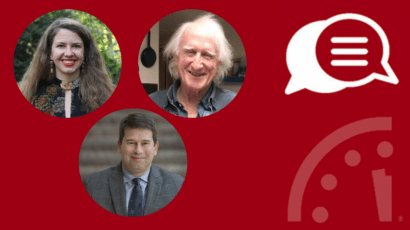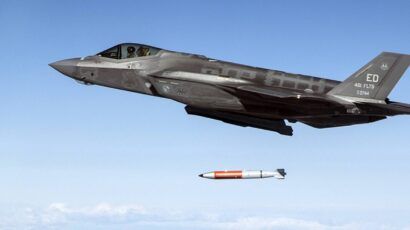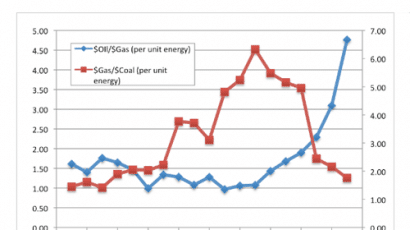Search results for Koch
Shortly after its failed April 13 rocket launch, North Korea was widely expected to conduct its third underground nuclear test. Such a test would have fit the pattern of the first two nuclear tests, both of which followed failed rocket launches and international condemnation. And Pyongyang has compelling technical, military, and political reasons to conduct a third nuclear test that would demonstrate it can miniaturize nuclear warheads to fit on a missile, making its nuclear arsenal more threatening.
Las víctimas de Chernóbil y los retos que presenta la opinión de los expertos
La preparación y la respuesta ante emergencias nucleares son en gran medida tareas técnicas, físicas. Implican equipos como bombas, generadores, contenciones y helicópteros. Sin embargo, no son solo técnicas. Como señaló mi colega de mesa redonda, Manpreet Sethi, para la preparación y respuesta también es necesario contar con sofisticados instrumentos legales y capacidades organizativas. Es … Continued
Las víctimas de Chernóbil y los retos que presenta la opinión de los expertos
La preparación y la respuesta ante emergencias nucleares son en gran medida tareas técnicas, físicas. Implican equipos como bombas, generadores, contenciones y helicópteros. Sin embargo, no son solo técnicas. Como señaló mi colega de mesa redonda, Manpreet Sethi, para la preparación y respuesta también es necesario contar con sofisticados instrumentos legales y capacidades organizativas. Es … Continued
The legacy of Ed Grothus and the Black Hole
--"Jesters do oft prove prophets," William Shakespeare, King Lear --"When one is legendary, one must do legendary things," Ed Grothus
What do we really know about urban agriculture’s impact on people, places, and the planet?
Urban agriculture is not automatically guaranteed to be more climate-friendly than conventional agriculture. But it does have an effect on the food and water resources of cities—and by including some very specific steps, urban farmers can indeed slash their carbon emissions.
Hot zone in the heartland?
The new coronavirus has plunged us into an infectious-disease crisis. As we respond, the years-long debate over N.B.A.F. raises worrying questions about American biodefense policy. Will more bio-labs help us fight outbreaks? Or are we building too many labs in too many places?
Board of Sponsors
David Baltimore, 1975 Nobel Laureate in Physiology or Medicine
Paul Berg, 1980 Nobel Laureate in Chemistry
Georges Charpak, 1992 Nobel Laureate in Physics
James Cronin, 1980 Nobel Laureate in Physics
Jayantha Dhanapala, former United Nations Under-Secretary General for Disarmament Affairs
Carl Djerassi, recipient of the National Medal of Science and the National Medal of Technology
谁能主导?
人类与环境间复杂且存在问题的关系正在变得更加复杂,且更有问题。事实上,此次"圆桌讨论"开始是为了讨论如何在满足能源需求和发展目标的同时,满足公众对环境的更高期望,现在则已变成一场有关人类必须怎样重建与大自然和谐关系的更广泛的讨论。我的同行们已经探讨了一些想法,如果推行就能实现这点。但正如政策问题常见的情况一样,问题在于是如何把想法变成现实。 Chuenchom Sangarasri Greacen 一直倡导一套经济上的改革,包括本地化及再分配——并已深入研究了诸如什么是美好生活以及人们在构建经济体和社会的时候应该有什么追求等问题。Greacen 的想法极为吻合一个被称为社会及团结经济(social and solidarity economy)的新兴运动。联合国社会发展研究所将社会与团结经济定义为由"如合作社、妇女自助团体、社会企业,以及具有明确社会和经济目标,并包含各种形式的合作与团结的非正式工人协会等组织"组成。运动中所内含的是对资本主义重视无休止积累的批判,以及对可以支撑替代形式的发展之价值观的寻找。 同时,Ashish Kothari 也强调了地球的生态极限,以及人类过度的经济活动将打破这些极限的危险。他的处方是有选择的经济"去发展"(de-growth):对于 Kothari 而言,"北半球"(Global North)的人以及"南半球"(Global South)的富人"必须大幅缩减对环境的影响,选择可持续的生活方式"。穷人的基本需求可以通过经济再分配得到部分满足。这在很大程度上是绿色经济模式,强调低碳、资源有效利用,以及社会包容性的发展,自全球金融危机发生后吸引了越来越多的关注。 Greacen 及 Kothari 提出了渐进式的愿景,能否实现受政治现实情况的约束。任何对市场、制度、规章、规范和决策程序的重大重组,例如实现我同行们的愿景所必须的重组,都需要民众授权。目前还没有这样的授权。更具体地说,触及能源的变动总是很难制定,因为能源并非普通的政策领域。相反,它是经济的命脉。日本、澳大利亚和加拿大等国家不仅没有拥护 Greacen 和 Kothari 倡导的彻底的渐进式的变动,甚至还在排放承诺上走回头路。大多数发达国家的民众对于气候变化怀着矛盾心理,认为与其生活距离遥远,而政府的政策也反映了这种矛盾心理。 这个世界迫切需要的是一个蓬勃发展的绿色政治的真实模式。但谁又能创造这样的模式呢?谁可以为实现地球的可持续发展来提供必须的领袖力呢? 希望寄托于知情的肯参与的公民身上。唯他们拥有改革资本主义的力量;唯他们能拥护生态可持续发展所必须的变革性的变化。
Trump and Putin meet under a nuclear cloud
In a few days, US President Donald Trump will meet with Russian President Vladimir Putin in Helsinki. Media coverage will undoubtedly highlight Russian meddling in the 2016 US presidential election, but it would be remiss not to discuss the nuclear implications of the Trump-Putin summit as well. Kto vinovat? (Russian for “who is to blame?”) … Continued
The cold crunch: How to cool people without overheating the planet
Buying an air conditioner is an effective way for individuals to adapt to a hotter climate. Sales are booming worldwide, which means increased energy consumption—and more warming.
Psychological reflections on the tragic dynamics of war
The fact that Putin has stopped alluding to using nuclear weapons is small comfort. We need to be very wary.
Bombs, science, and baby teeth
How many nuclear weapons can be detonated in support of weapons development or during a war before imperiling humans from radioactive fallout? That’s the question the Atomic Energy Commission asked in the 1950s. To find the answer, scientists, citizens, and later the St. Louis Committee for Nuclear Information looked at baby teeth where strontium 90—a radioactive isotope—is absorbed as if were calcium. The work combined scientific research with a political movement aimed at ending the nuclear arms race. It also played a role in the ratification of the 1963 Limited Test Ban Treaty. The wisdom and extraordinary effort of preserving these baby teeth for some 60 years later opened doors for cutting-edge research involving an array of pollutants.
European nuclear deterrence in the era of Putin and Trump
A “Eurodeterrent” that would rely largely on French nuclear weapons and German funding might be the best way for Europe to take charge of its own security and defense in the face of Russian threats and American waffling.
Virtual Program—What’s next for Russia: Does Putin matter?
Watch the Bulletin virtual program “What’s next for Russia: Does Putin matter?” featuring Melinda Haring and Charles Strozier in conversation with Daniel Drezner. These experts discussed how Russian national interests will define any successor’s actions, and whether those around the current President share the same political psychology. Our conversation draws from the Bulletin’s November/December issue Russia After Putin.
Nuclear weapons sharing, 2023
This Nuclear Notebook issue examines the current state of global nuclear sharing arrangements, which include non-nuclear countries that possess nuclear-capable delivery systems for employment of a nuclear-armed state's nuclear weapons.
Chernobyl fatalities and the challenges of expert judgment
Preparedness for and response to a nuclear emergency are in large part technical, physical undertakings. They involve equipment such as pumps, generators, containment vessels, and helicopters. But they aren't just technical. Preparedness and response also involve, as my roundtable colleague Manpreet Sethi has pointed out, sophisticated legal instruments and organizational capacities. Moreover, as noted in … Continued
Five assessments of the Fukushima disaster
A survey of books on the catastrophe at the Fukushima Daiichi nuclear power plant, three years after the earthquake and tsunami known collectively as 3/11.
I was wrong; natural gas will dominate
In September 2009, I authored an essay for the Bulletin of the Atomic Scientists in which I argued that the then recent divergence between oil prices and natural gas prices was temporary.
I was dead wrong.
